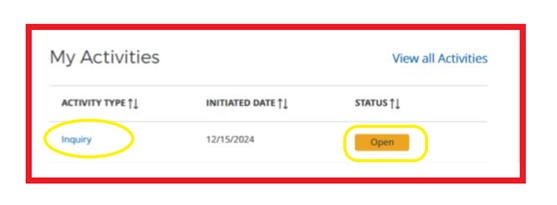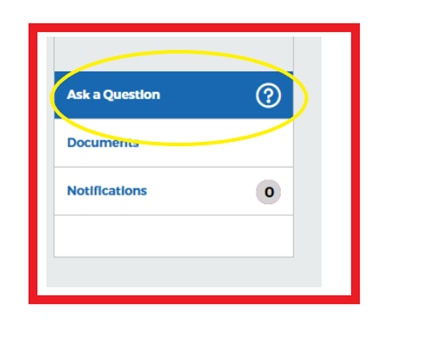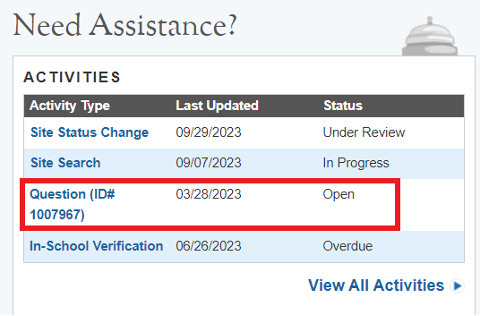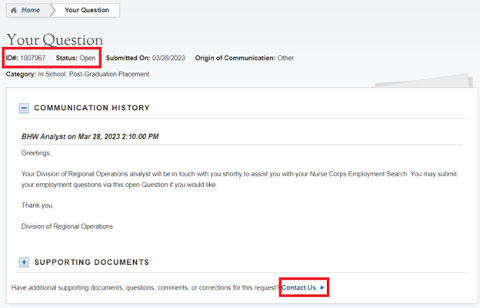Nurse Corps Scholarship Program scholars must begin employment at an eligible Critical Shortage Facility with either a mental health or primary care Health Professional Shortage Area score of 14 or higher within nine months of graduation.
On this page
Nurse Corps Transition to Service process
Your employment search process and converting you from student/training to a licensed clinician working toward your service obligation is officially referred to as the Nurse Corps Transition to Service process. A regional analyst is assigned to provide administrative support throughout this process to ensure you successfully transition into your service obligation. However, you are responsible for communicating with potential employers and obtaining a job offer.
Follow this Nurse Corps Transition to Service step-by-step guidance to successfully conduct your employment search and comply with all program requirements.
To prepare for service, you must:
- Communicate with your assigned analyst using My BHW.
- Review your Nurse Corps service commitment.
- Review your practice hour requirements.
- Understand Nurse Corps-approved sites.
- Understand Health Professional Shortage Area (HPSA) scores and how they impact your service obligation.
Communicating with Nurse Corps
- As a scholar, you will receive a message in the My BHW notifying you of an Inquiry that you will use for all employment-related correspondence.
- This inquiry is listed under “My Activities” with an “Open” status.
- To communicate directly with a regional analyst using this Inquiry:
- Go to your portal home page, view “My Activities” box, select Inquiry (Open).
- Select Contact Us at the bottom of the message to directly reply to the Nurse Corps analyst.

- Alerts from noreply@hrsa.gov are sent to your personal email, notifying you of a new portal message.
- Use this Inquiry to communicate with an Nurse Corps regional analyst. The regional analyst will provide administrative support and answer all employment-related questions throughout your job search process.
Note: If you have other questions (such as programmatic, disbursements, or half-time conversion requests), go to Ask a Question in the My BHW Portal, located in the lower left bottom of your screen.

Ask a question
Note: If you have other questions regarding tuition, stipends, or post-graduate training, go to Ask a Question in My BHW.
To communicate directly with an analyst using the Question (ID#):
- Go to Activities/Activity Type/Question (ID#).

- At the bottom of the page, select Contact Us to directly reply to your analyst.
- Also use My BHW to update your personal contact information, and upload employment documents.

Review your service commitment
- Start working at a Critical Shortage Facility (CSF) within nine months of graduation or the end of your training, as required by your NC contract.
- Make sure the CSF has a mental health or primary care Health Professional Shortage Area (HPSA) score of 14 or higher.
- Consult the Nurse Corps Application and Program Guidance (APG) (PDF - 486 KB) to understand your service commitment, eligible site types, work hour requirements, financial responsibilities, and legal obligations.
- You may be employed at multiple work sites if they are within a single network or employer. All sites must be active Nurse Corps sites with a primary care or mental health HPSA of 14 or higher.
Understand your clinical service requirements
- Full-Time: Work at least 32 hours per week, with a minimum of 26 hours dedicated to clinical services or direct patient care at the approved site.
- Part-Time: Work between 16 and 31 hours per week. Note that part-time service (less than 32 hours a week) will lengthen your service period.
- If you start full-time or part-time and wish to switch, you can request this change through My BHW by selecting “Ask A Question.”
Understand Critical Shortage Facilities (CSF)
- A CSF is a health care facility with a significant shortage of nurses, located in or serving a primary care or mental HPSA.
- All eligible CSF sites are listed in our database and marked as “Nurse Corps-Approved” sites.
Understand HPSA scores and how they affect your service obligation
- HPSA scores: These scores indicate how much a health area needs professionals. They range from 0 (lowest need) to 26 (highest need) and can change over time. They are set in collaboration with states and counties.
- HPSA categories: There are three types—primary care, dental, and mental health.
- Finding HPSA scores:
- Use HPSA Find: Go to Tools and select "Shortage Area by Address" to search for scores.
- Use the Health Workforce Connector: Enter the site’s location and click Search. Then, under the Sites tab, choose a site to view its HPSA scores.
- Nurse Corps requirements: To fulfill your service obligation, your site must have a mental health or primary care HPSA score of 14 or higher.
Suspensions, waivers, and deferments
If you can’t start your service as planned:
- Notify your analyst immediately
Let your regional analyst know right away if you can’t begin service. - Submit your request
You must submit requests for suspensions, waivers, or deferments yourself. Your assigned regional analysts cannot submit these requests for you. Use My BHW and include all required medical, education, and financial information. Check the Nurse Corps Scholarship Application Program Guide for details on required documentation.
Types of requests:- Suspensions
- Medical or personal hardship
- Parental
- Call to Active Duty in the Armed Forces
- Waiver
- Granted only in extreme hardship cases and is rarely approved.
- Deferments for post-graduate training or residency
- You can request up to an 18-month deferment to complete approved post-graduate training or residency.
- After finishing your residency, you have three months to start employment.
- To request a deferment, upload an official letter from your residency director, including the program's start and end dates.
Note: If you complete post-graduate training at an eligible Critical Service Facility in a HPSA with a score of 14 or higher, you will get service credit and don’t need to request a deferment.
Contact us
Call 1-800-221-9393
(TTY: 1-877-897-9910) M – F, 8 a.m. – 8 p.m. ET
(except federal holidays)
Email us or GetHelp@hrsa.gov
My BHW, select Ask a Question



